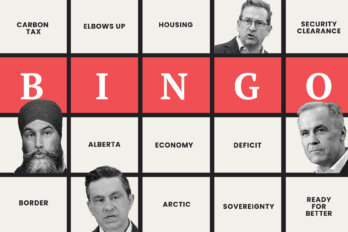In the wake of the big reveal of Canada’s new anti-terrorism bill, which Stephen Harper unveiled last Friday, media outlets have been full of quotes and stories about the proposed legislation’s potential dangers to everything from our privacy to our safety (one line of thinking goes that increasing incarceration without implementing rehabilitation strategies will only lead to more radicalization of inmates). Many of these concerns are valid and worth thorough consideration. Perhaps you’ve already heard Privacy Commissioner Daniel Therrien fretting that Bill C-51 “would seemingly allow departments and agencies to share the personal information of all individuals, including ordinary Canadians who may not be suspected of terrorist activities, for the purpose of detecting and identifying new security threats.” The British Columbia Civil Liberties Association has gone on record as being concerned about the Act’s extension of the length of time (from three days to seven days) police can detain suspects without charging them. Meanwhile, Christianne Boudreau, whose Calgarian son Damian Clairmont died in Syria while fighting for ISIS last year, is warning that the legislation is too “reactive and rigid.” But by far the bill’s most serious flaw is the injury it does to freedom of thought.
The Anti-terrorism Act, as it’s known, gives government the power to “order the removal of terrorist propaganda” from the Internet. (It also allows a judge to order an ISP to “provide the information that is necessary to identify and locate the person who posted the [offending] material.”) Government is further empowered to imprison anyone who “by communicating statements, knowingly advocates or promotes the commission of terrorism offences . . . while knowing that any of those offences will be committed or being reckless as to whether any of those offences may be committed, as a result of such communication.”
Let’s translate that into English. If you post an anonymous blog about a sensitive political subject—say, criticizing Canada’s military role in Afghanistan—it’s now legal for the authorities to have your post wiped from the web and have you tracked down and put behind bars.
Does that sound paranoid?
The sad truth is that it’s not, especially if you look at the wording involved. Bill C-51 doesn’t just deal with statements that advocate terrorism; it also covers statements that “promote” terrorism. To be found guilty, the person who made those statements doesn’t need to have known his words or images would lead to an act of terrorism. It’s enough that he was simply “reckless” about whether what he was saying might cause someone out there to commit a terrorist act.
But couldn’t any persuasively worded condemnation of a government foreign policy potentially cause someone to resort to terrorism, provided that someone is already angry, crazy, or radicalized enough (or some combination thereof) to begin with? For example, if a bleeding heart university student goes online and writes a mournful piece about the suffering those in Gaza are experiencing because Canada won’t work with Hamas (which Canada recognizes as a terrorist organization), could that not be said to be a potential trigger of a terrorist attack on Jews? And if so, is that really the writer’s fault? Are we now to self-censor our words—for fear of arrest and jail—based on the minimal morals and levels of self-control of the worst and most violent among us?
What if that same earnest university kid shows up at a rally for aid for Gazans, holding a Hamas flag? Are we really okay with putting him behind bars simply for waving a symbol? A symbol that he may naively but innocently associate with his humanitarian cause?
If so, consider that there are more than fifty terrorist “entities” currently listed by the Canadian government. That’s a lot of symbols that have suddenly been banned by a bill that we’ve been assured does not violate Canadians’ freedom of expression.
Consider also the satirist. On his podcast the other day, American comedian Adam Carolla spent several minutes mocking ISIS’s latest beheading propaganda video, which threatens to behead President Barack Obama in the White House. Carolla’s bit was funny, brash, and offensive; he jokingly told ISIS to aim for a slightly more attainable goal, like beheading minority leader Nancy Pelosi instead of the president. It’s quite conceivable such a comic rant could land a Canadian Carolla in prison if Bill C-51 is passed.
But it’s worth thinking not only of the effect the new legislation will have on the innocent and potentially sympathetic critics—those who speak or those who don’t dare to. What about those with ideas we really don’t like? What if the university student isn’t naive and actually believes in Hamas wholeheartedly, including the idea that an Islamic state must be established in Israel at all costs?
We’d still be wise to let him speak, if not to act, for the reasons John Stuart Mill gave when writing about censoring expression:
[T]he opinion which it is attempted to suppress by authority may possibly be true. Those who desire to suppress it, of course deny its truth; but they are not infallible. They have no authority to decide the question for all mankind, and exclude every other person from the means of judging.
In fact, it’s by letting people judge for themselves that we maintain a thinking, questioning population that can meaningfully hold its government to account. Ironically enough, it’s those very same qualities that also best protect people from radicalization and the blind following of any authority, including an authority that tells them it’s their duty to hate and kill.
They say one man’s terrorist is another man’s freedom fighter; we don’t and shouldn’t allow the sorting out of which one is which to be settled by violence.
But allowing it to be settled with words, images, and expression is not only okay. It’s the key to a healthy society, even if the process entails seeing and hearing considerable ugliness. Sometimes that’s what freedom costs.



